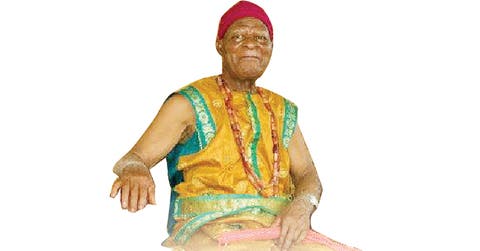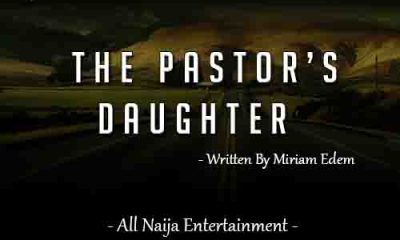General
“I Abolished Osu Caste System So That Our Pretty Women Would Marry” – Igwe of Nnewi

Obi of Otolo and Igwe of Nnewi in Anambra State, Igwe Kenneth Orizu, speaks to TONY OKAFOR about the abolition of the Osu caste system in his kingdom, among other issues
You have been on the throne since 1963; did you ever imagine that you could serve for this long?
No, I didn’t. It’s the grace of God that brought me this far. I didn’t expect this long reign. I thank God for his grace.
Being on the throne for so long, do you sometimes get bored or feel your lifestyle has become monotonous?
I have not felt bored since I ascended the throne. Initially, it was hectic but with time I set up committees that have assisted me to do the work of the kingdom seamlessly.
You are from a privileged background as your uncle, Nwafor Orizu, was a senate president and your grandfather was said to be the first man to drive a car in the old Eastern Region. What are the fond memories you have of your childhood?
Orizu 1 started his reign around 1905. No one dared to see him with your naked eye. He moved mostly at night if he was travelling to far places, for instance, when going to court in Onitsha because that was the only place the court was then. They were four monarchs that attended Onitsha court in those days – he, Obi of Onitsha, Amobi in Ogidi, and Idigo in Aguleri. There were very few monarchs then.
There were no vehicles then so he went to Onitsha by a shoulder carriage (palanquin) carried by 16 able-bodied men. Four men would start and when they got tired, another four would take over and they would continue to take turns until they got to Onitsha after some days. Once they got to Onitsha, they would carry him to a guest house and he would rest to attend court the next day by 9am. After the court proceedings, he would return to his guest house again and rest till 8pm when he would begin the journey back to Nnewi. Nnewi monarchs never travelled during the day in those days to avoid being seen by ordinary people. It was taboo to see Igwe Nnewi with the naked eye in those days; seeing him with the naked eye attracted sanctions. He went on night journeys with his retinue of bodyguards who rang the bell to warn people to steer clear because Igwe Nnewi was on the road.
Nobody would dare come out otherwise they would be conscripted and sold as slaves or made to become one of the wives of the monarch if she was beautiful.
At a point, going to court in Onitsha became tiresome such that his subjects bought a motorcycle for him. However, he didn’t use it for a long time because of the inherent danger it exposed the Igwe to. So, they considered buying a car for him. That was how money was raised and given to some persons that went to Lagos and bought a Ford car for him.
When the news of the new car spread, the white Resident Officer in Onitsha visited Orizu in Nnewi. The white man observed that the car had no number plate and licence to enable the monarch to drive it without being disturbed on the way. He promised to help Orizu get his vehicle registered by establishing a licencing office in Onitsha. That was how a licensing office was established in Onitsha and my grandfather was issued a number plate that read: Onitsha 1.
As a young man, you worked with a group of newspapers, what did you enjoy most about the experience?
Yes, I worked with the Outlook Newspaper in Enugu. But in the course of my job, I was posted to various places such as Port Harcourt, Onitsha, Asaba, Sapele to establish Outlook offices. I did that diligently and sales and readership improved for the outfit in most areas where the newspaper was previously not known. I enjoyed the sense of dedication and punctuality I passed on to workers. I made them come to the office by 5.30am instead of 8am to distribute papers to vendors.
You were said to be instrumental to the clearing of Agbedo forest in your domain, what significance or problems did this forest have?
Edo Nnewi was one of the deities in Nnewi which the people worshipped as a god. It was a female deity. Deities ruled Nnewi then while Obi was their link with the people. They relied on the deities to determine what would happen. It was when the late Chukwuemeka Odumegwu-Ojukwu was Governor of Eastern Region that he suggested that the Agbedo forest should be cleared. He wrote a letter to me to see how Nnewi town could start. I agreed with him but told him that since the Agbedo was jointly owned by the community, the other Obis of Nnewi should be consulted, including the priests of the various shrines.
Before then, you dared not enter the forest, otherwise you would die. When the decision to clear the forest was taken and the date was fixed, everyone was afraid to enter the forest because they were afraid that if they tried it, they would die. I was at home on that day because I had another engagement to attend to. Some four men were delegated to meet with me because everyone was afraid to be the first to start clearing the forest. They said the entire town had assembled for the clearing of the forest and were waiting for my endorsement. I gave them approval to go ahead with it but they still waited for me. When I got there, I had to start the clearing first after praying, before they now took over. There were so many dangerous animals there, including lions, reptiles, and leopards, but all of them ran away and only tortoises which could not run were left. Eventually, everything went well.
You were said to be one of the first traditional rulers in Igboland to abolish the Osu caste system, what challenges did you face that opposed the move at the time?
Nobody opposed the move. If there was any opposition, they didn’t come out to state it publicly. Till date, I’m still being commended for abolishing the caste system. I abolished the caste system because it didn’t have any value, in my opinion. In the old days, our people castigated them – those regarded as Osu. The story dates back to the old days when people found guilty of abominations were cast away to avoid the anger of deities. If any of such persons slept on the same mat with you, you became an Osu automatically. You would not sit on the same seat with them, otherwise you became an Osu. That was how they were treated and abhorred.
But with the advent of civilization, the practice became laughable, especially after the Agbedo was cleared which now became one of the largest markets in Anambra. Part of the forest was also meant for the Osu people. After the Nigerian Civil War in 1967, there was a dance Osu girls came out with. It was so attractive that after the dance, many of them were impregnated by the so-called non-Osu people because they were so beautiful. Not only that, these same beautiful women were branded Osu in the day, but at night, many people would go for them. I thought that was outright deception. I told my people that the deceit must stop. By the way, who did God create and call Osu? It was man-made. So, it was largely because of those beautiful women and the obnoxious conditions they were subjected to that made me abolish the caste system in Nnewi to enable them to freely marry. And shortly after the abolition, many of them started getting married. We don’t have any problem with that again in Nnewi. We are one.
You discouraged wasteful spending at funerals and traditional marriage ceremonies, why?
I looked at the way we conducted funerals here; it was associated with wasteful spending and was affecting the people, so I thought something must be done about it. I made consultations and we decided to cut everything down to the barest minimum. Today, you can hardly see any funerals in Nnewi with wasteful spending. If anyone violates the rules, there are attendant sanctions for that. We collectively achieved the feat, so nobody is complaining about it.
Ofala Nnewi is a cultural festival organised annually to celebrate your coronation and it must be done without fail, what does it entail?
Ofala Nnewi was a white man’s concept. He probably borrowed it from the Onitsha area. Like I said earlier, the naked eye was not allowed to see the Igwe Nnewi in the beginning. If you were a man and you dared try to see him, you would be sold as a slave and if you were a beautiful woman, you would be automatically given to the Igwe as his wife.
So, the whites didn’t like that Igwe was not seen by his subjects. He suggested to Igwe Nnewi to have a day in the year when he would make a public appearance to interface and interact with his people. That was the origin of the Ofala festival here in Nnewi. It was an opportunity for the monarch to meet with his people and interact with them and for them to pay homage to him.
If it is not celebrated in a year, what implications will that have on the kingdom?
If there are exigencies, Ofala can be postponed. There is no implication whatsoever on the kingdom by so doing. I had once cancelled Ofala celebration here, nothing happened. But that was the only year it was not celebrated since my reign in 1963.
The Igwe of Nnewi is born and not made or elected, unlike many traditional stools in the country; can you share some of the other peculiar things about the throne?
Out of the four quarters in Nnewi, Otolo is the head and it’s the one that produces the monarch, traditionally and customarily. Our forebears put it that way and it has been kept that way and it will remain so. The ascendancy to the throne of Nnewi monarchy is by birth and not by election. Whoever is the first son of the monarch succeeds him upon his death, unless he does something grievous against the people and custom of the land. This practice is known to everybody in Nnewi. It’s enshrined in the Nnewi Constitution.
There are four Obis in the four clans that make up Nnewi and you’re the most senior of them. How would you describe your relationship with the others?
My relationship with the three Obis is cordial. We work together and we relate well in the overall interest of the community.
Apart from Ofala, what other festivals are significant to the history of Nnewi and its people?
We have festivals like Igba Ota, Igbu Ichi, Ikwu aru, and Igbu Ichebili. Most of these festivals, however have been stopped because of modernisation.
What are the things considered as taboo for the people of Nnewi and others who live in or visit Nnewi?
We don’t eat ‘Eke’ (python) and women don’t climb palm trees in Nnewi. Also, women don’t pluck kola nuts. We don’t eat ‘Ewi’ (local rabbits) because of the historical relationship we have with it.
Are there things considered as taboo for you as the traditional ruler of Nnewi too – things that culture does not allow you to do?
The Nnewi king does no wrong.
What have been the biggest challenges you have faced on the throne?
There are several of them. I was not born the same way others were born. I was a child of circumstance. There were no childbirths in this kingdom before my mother was married because of a certain woman that was allegedly maltreated and who later died; people were marrying but did not have children. It was when the woman was appeased that my mother got married and gave birth to me. But she died mysteriously shortly after. It was suspected that she might have been poisoned out of jealousy by her other wives who were married before her but had no children. That’s how my life began. That history guided my growing up and made me humble. I had two ghastly motor accidents which nearly took my life. The first time; I was in a Mercedes Benz car bought for me by my people. We were coming back from Lagos when the car somersaulted twice and at the third time, turned upside down. But I came out unhurt. The second time; I was on my way back from Abuja when a large vehicle knocked ours off the road and into a ditch.
What do you miss most about your old life; that is, before you became a traditional ruler?
Early, I started staying away from women. In fact, their lives pissed me off. I only had a girlfriend when I lived in Calabar (in Cross River State). I sat the Standard Six Certificate examination there. Calabar had a stadium where festivals were held and it also served as a cinema. She liked us to attend such festivals together. She would book for our tickets. When I came back to Nnewi, during my students’ union days, I ran into another one who requested money from me to buy a photo album. I told her I didn’t have money and the relationship ended there.
So, in the real sense of it, I didn’t have a girlfriend the way people have girlfriends these days. I lived in Kano and had no girlfriend. All I did as a youth was to take care of myself, cook for myself and read. I had no business with women. Unfortunately, this generation is funny. Today’s men are milked dry by women. When you give them money, your energy and time, you are wasting and killing yourself gradually.
Nigeria recently celebrated its 60th independence anniversary, what biggest changes have you noticed over the years – positive and negative?
I’ve yet to see anything worth celebrating in Nigeria. It’s unfortunate that Nigeria can’t produce pins and razors as small as they are. If they produce them, I’ve yet to see them. We rely so much on imported goods, yet we keep boasting that we are the giant of Africa. I have yet to see any positive changes in this country. Nigeria has not met my expectations.

-

 Technology3 years ago
Technology3 years agoVoIP Number: Everything You Need To Know
-

 Music2 months ago
Music2 months ago[Music] Gnash Ft Olivia O’Brien – I Hate you, I Love you
-

 Music2 months ago
Music2 months ago[INSTRUMENTAL] John Legend – All Of Me
-

 Music2 months ago
Music2 months agoAlan Walker – Faded [INSTRUMENTAL]
-

 Music2 months ago
Music2 months ago[Video] 21 Savage ft. Offset & Metro Boomin – Rap Saved Me
-

 Music2 months ago
Music2 months ago[Instrumental] Wiz Khalifa – See You Again ft. Charlie Puth
-

 ANE Stories5 months ago
ANE Stories5 months ago[STORY] AMAKA THE LESBIAN (Complete Episodes)
-

 Music2 months ago
Music2 months ago[Music] Akon – Sorry Blame It On Me






























